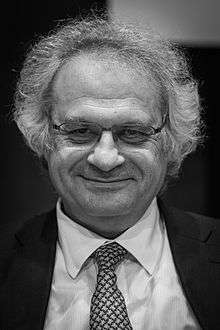Amin Maalouf
| Amin Maalouf | |
|---|---|
 Amin Maalouf by Claude Truong-Ngoc, 2013. | |
| Born |
25 February 1949 Beirut, Lebanon |
| Occupation | Writer, scholar and novelist |
| Language | French |
| Notable works | Leo the African, Rock of Tanios, The Crusades Through Arab Eyes, and Samarkand |
Amin Maalouf (Arabic: أمين معلوف; born 25 February 1949) is a Lebanese-born French[1] author. Has lived in France since 1976.[2] Although his native language is Arabic, he writes in French, and his works have been translated into many languages.[3] He received the Prix Goncourt in 1993 for his novel Le rocher de Tanios (English: The Rock of Tanios). He was awarded the Prince of Asturias Award for Literature in 2010. He was elected a member of the Académie française on 23 June 2011 to fill seat 29, left vacant by the death of anthropologist Claude Lévi-Strauss.[4] Maalouf is the first person of Lebanese heritage to receive that honor.[5]
Biography
Maalouf was born in Beirut, Lebanon and grew up in the Badaro cosmopolitan neighborhood,[6] the second of four children. His parents had different cultural backgrounds. His mother was born in Egypt, where her father, a Maronite Christian married to a woman born in Turkey, had gone for work. His Lebanese father was from the Melkite Greek Catholic community. Maalouf's mother was a staunch Catholic who insisted on sending him to Collège Notre Dame de Jamhour, a French Jesuit school. He studied sociology at the Francophone Université Saint-Joseph in Beirut.
He worked as the director of the Beirut-based daily newspaper An-Nahar until the start of the Lebanese civil war in 1975, when he moved to Paris, which became his permanent home.
Maalouf's first book, The Crusades through Arab Eyes, 1983, examined the period on the basis of contemporaneous Arabic sources.[5]
In 1993, Maalouf was awarded the Prix Goncourt for his novel Le rocher de Tanios, set in 19th-century Lebanon.[7][8] In 2010 he received the Prince of Asturias Award for Literature for his work, an intense mix of suggestive language, historic affairs in a Mediterranean mosaic of languages, cultures and religions and stories of tolerance and reconciliation.
Maalouf has been awarded honorary doctorates by the Catholic University of Louvain (Belgium), the American University of Beirut (Lebanon), the Rovira i Virgili University (Spain), and the University of Évora (Portugal).[2]
Besides novels, he has written four texts for musical compositions and several works of non-fiction, of which Crusades through Arab Eyes is probably the best known.[1]
Fiction
Maalouf's novels are marked by his experiences of civil war and migration. Their characters are itinerant voyagers between lands, languages, and religions.
- (1986) Léon, l'Africain; English translation: Leo Africanus (1992, Peter Sluglett) ISBN 1-56131-022-0
- (1988) Samarcande; English translation: Samarkand (1994, Russell Harris) ISBN 1-56656-293-7
- (1991) Les jardins de lumière; English translation: The Gardens of Light (1996, Dorothy S. Blair) ISBN 1-56656-248-1
- (1992) Le Premier siècle après Béatrice; English translation: The First Century after Beatrice (1993, Dorothy S. Blair) ISBN 0-7043-7051-4
- (1993) Le Rocher de Tanios (Prix Goncourt); English translation: The Rock of Tanios (1994, Dorothy S. Blair) ISBN 0-8076-1365-7[9]
- (1996) Les Échelles du Levant; English translation: Ports of Call (1996, Alberto Manguel) ISBN 1-86046-890-X
- (2000) Le Périple de Baldassare; English translation: Balthasar's Odyssey (2002, Barbara Bray) ISBN 1-55970-702-X
Non-fiction
- The Crusades Through Arab Eyes (English translation of Les Croisades vues par les Arabes, 1983), 1986. ISBN 0-8052-0898-4
- In the Name of Identity: Violence and the Need to Belong (English translation of Les Identités meurtrières, 1998; translated by Barbara Bray, 2000). ISBN 0-14-200257-7
- Origins: A Memoir (FSG, 2008) 1st edition 2004 winner of the Prix Mediterranee 2004¨
- Disordered World (English translation of Le Dérèglement du monde, 2009; translated by George Miller, 2011).
Librettos
- L'Amour de loin (Love from Afar), opera, 2000
- Adriana Mater, opera, 2003
- La Passion de Simone, oratorio, 2006
- Émilie, monodrama, 2010
All Maalouf's librettos have been written for the Finnish composer Kaija Saariaho.
Notes and references
- Jaggi, Maya (16 November 2002). "Profile: A Son of the Road". The Guardian. Retrieved 29 November 2009.
- 1 2 "Amin Maalouf" Archived 27 December 2012 at the Wayback Machine., Modern Arab writers.
- 1 2 "About the author", with Amin Maalouf.
- ↑ "Amin Maalouf - Prestige Magazine". Prestige Magazine. 2015-01-12. Retrieved 2016-10-17.
- ↑ "Amin Maalouf entre à l'Académie française". Le Monde. 14 June 2012. Retrieved 10 October 2015.
- 1 2 "Lebanese novelist Amin Maalouf joins elite French Academy", The Daily Star, 15 June 2012.
- ↑ Amine Maalouf Bedroom
- ↑ Reuters (9 November 1993). "Amin Maalouf wins top French book award". Toronto Star.
- ↑ Annie Coppermann, "Amin Maalouf, lauréat attendu du prix Goncourt" (in French), Les Echos (9 November 1993).
- ↑ "Le palmarès" (in French). Académie Goncourt. Archived from the original on 6 November 2009. Retrieved 27 November 2009.